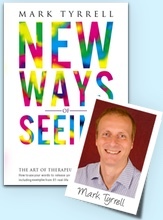
There are a few valuable ways we can help lighten the load of terminally ill patients
“Nothing endures but change.”
— Heraclitus
She was dying. She had maybe four weeks left in the world. And she had only one wish: to see Swan Lake one last time at the Royal Ballet House.
But there was no way she could physically go. And she was inconsolable.
Her daughter (a student on my psychotherapy course) had pleaded with me to see her. She needed to have less pain and be more settled. And most importantly, she needed to get some sleep. What could I do for her?
Prefer to watch instead?
I visited her in her home. Apparently she had always been a bit ‘difficult’ and grumpy. But she seemed to think I was okay.
She could barely even speak. So I gently spoke to her. I made few demands and asked few questions.
I lulled her with hypnotic talk of things I thought would interest her. And throughout my imperfectly informed ballet conversation I sprinkled suggestions for sleeping better and feeling more comfortable.
Despite her distrusting nature, she settled. She permitted her burdensome eyelids to close and began to show signs of entering the natural comforts of a peaceful hypnotic trance.
Her laboured breathing became deep and even. The creases in her forehead smoothed. The frown that had been tugging at her face vanished. Here and there, I could even see a subtle smile dancing about her mouth.
She had left the room. Or at least her mind had. So where did she go?
One last time
If she heard anything I said, and she seemed to respond to my words, then she attended the ballet.
She got dressed up, felt glamorous, travelled to the theatre, smiled and nodded to others, and took her seat “in just the right part of the auditorium”.
She was dazzled by the gravity-defying grace of the dancers, swooping eagles one minute, gliding swans the next. She relished the music, the time, the place.
She had been to the ballet one last time.
I never saw her again. A few weeks later her daughter told me she’d passed on. But she’d seemed calmer, more content, and had slept better ever since her ‘visit’ to the ballet. She’d had a “good death”.
I too felt content in the knowledge I’d done all I could. I had helped, in some small way. And that’s what it’s all about with terminal clients.
We’re not there to fix anything (although of course sometimes people do live when they were predicted to die). We’re not there to make everything okay. We’re simply there to help in any way we can.
We may be able to help people adjust, feel more comfortable, enjoy what they can enjoy, and manage their fears.
When death gets close our perception of time changes. How do we think about the future when it’s barely there?
The future isn’t what it used to be
So much therapy and coaching is future focused. In fact, so much of life in general has us looking forward.
- “Are you planning on going away next summer?”
- “What kind of work do you want to do?”
- “Would you ever like to marry and start a family?”
These constant references to the future are perhaps even more prominent in the lives of younger people. Accordingly, when a young person learns they have little time left, the sense of a future taken away may be much more keenly felt.
Mind you, we can’t make assumptions. Some people facing the end do think about the future – just in a contracted sense.
Take my uncle for example. He went from seemingly healthy to only having a few weeks of life left. Yet he didn’t seem depressed, because his lifelong pragmatism kept him focused on detail and progression.
He took great efforts to arrange his own funeral. He even contributed to his son’s eulogy for him! So we can’t assume the future is of no interest to our terminal clients.
Either way, the final phase of life is full of emotional challenges as well as physical ones. So what specifically can we do for clients facing death?
Here are some ideas I’ve picked up over the years.
1. Help them take care of business
The older woman I described above had the ‘unfinished business’ of wanting to go the ballet. Through therapeutic hypnosis I was able to help her feel as if she had tied off that particular loose end.
One client regretted that he’d never said goodbye to his father, who had died years before. Now he himself was dying.
I asked him to think about what he would have liked to have said to his dad, then I hypnotized him and got him to feel as if he were actually communicating with his father. He didn’t believe he’d said goodbye to him after hypnosis, but he felt as if he had. Those feelings were successfully resolved.
Unfinished business might also be of a more practical nature. We might need to help our clients emotionally prepare for talking to relatives about past or current events, or help them resolve past emotional difficulties. Some clients might need help shaking feelings of guilt about leaving loved ones, or even about causing inconvenience!
But the past isn’t just to be resolved or ‘dealt with’. It’s a resource that can be used to help make final days happier and more meaningful.
2. Help them enjoy their past
It feels like our continued existence is a dead certainty (no pun intended!). But none of us, not you nor I, are guaranteed a future, or even a tomorrow. If we’re fit and healthy and not prone to physical recklessness our chances are good. But a guarantee? Nah.
We, quite rightly, make plans anyway.
But someone who is terminally ill may not be able to think very far into the future. They may not want to. The green and pleasurable pastures of the past may be much more attractive than the painful plains of now and later.
So why not revive it? If it’s not realistic to talk positively about the future, look to the past for inspiration instead. There are times when ‘living in the past’ isn’t such a bad thing.
I’ve certainly encouraged clients, if they’ve wanted to, to talk about the past. To give it a narrative. To tell me where they’ve been, what they’ve seen, who they’ve loved, what made them laugh, what they’ve enjoyed.
And using hypnosis we can help clients enjoy these times all over again. We can help them re-enjoy the rolling landscapes of times gone by. Humour, triumph, romance, love, curiosity, learning, togetherness, spirituality. They’re all there in the past, waiting to help the present.
But to improve your client’s mental state it may also be necessary to help them manage the physical aspects of their illness.
3. Help manage pain
“Pain is never permanent.”
— Saint Teresa of Avila
I love the case study about Milton Erickson in which he helps a dying woman control her intractable and life-sapping cancer pain as she lives out her last weeks.
He uses hypnosis to teach her to disassociate from the pain. Using trance, she is able to leave her pain-wracked body and go into another room, to hypnotically watch TV (in reality never leaving her bed). In this way, she can let go of her pain.
We can use reframing, dissociation, direct suggestions for hypnotic anaesthesia, metaphor (such as turning down a ‘pain dial’) and many more tools to help our clients feel more comfortable and confident. And we can give them the tools to help themselves.
Simply helping our clients let go of tensions and relax deeply and regularly can help them both physically and emotionally.
But of course many dying people are not just thinking about their own situation.
4. Help them worry less about loved ones
I treated a woman in her 40s with metastatic cancer. She had a nine-year-old son and a seven-year-old daughter and was tortured by worry and guilt over what would happen to them after she was gone. How her death would affect them.
I think it was useful for her just to air these feelings, as she had been keeping them locked in. But I also wanted those thoughts to feel less burdensome to her.
I gently spoke to her about human resilience. We spoke about how the people in her children’s life, including their father, would come together and heal together. How they would live and grow, and part of her would always be with them. We explored these ideas both in and out of trance.
People don’t forget events, they process them. We can help reassure our clients that their loved ones will continue to love, to be loved, and to remember. Grass will always find a way to grow to the surface, even through concrete.
5. Help them remember to forget sometimes
For some terminally ill clients constantly talking about, or more probably thinking about, the prospect of death can feel like too much to bear. Sometimes we can help them with this too.
One client, a 30-year-old woman who had been cured of cancer (I suggested we think in terms of cure, not the temporary ‘remission’ so often used clinically), told me it was still constantly on her mind.
“Not half an hour goes by that I don’t think about the cancer. Why me? Will it return? What’s that ache, pain, itch?”
I used hypnosis with her to suggest times of natural forgetting: when we forget the name of someone we went to school with, or where we put the keys. I related this to forgetting about the cancer, and I suggested that her half-hour windows of forgetfulness would start to stretch out to full days and more. And it worked. She began to think about it less and live her life.
But even when cure doesn’t happen, we can still help free our clients not just from pain but also from thoughts about their situation. Hypnosis can really help in the creation of therapeutic amnesia.
6. Help them say goodbye
Not everyone gets to say goodbye to their loved ones at the end. Alas, most deaths don’t follow the Hollywood cliché. But many clients may feel they want to say things to loved ones before they go, while they’re still lucid. And they may find this difficult.
One man wanted to tell his parents how much he loved them before it was too late. But his relationships with both of them had been rocky at times, so the prospect was daunting. We hypnotically rehearsed him saying everything he wanted to and he found, when the time came, he could do this.
So we can gently ask clients if there is anything left unsaid they’d like to say to people, and help them find the resources to do it.
We will all have to say goodbye to all and everything in this world someday. To know that, and to be calm and content in that knowledge, is to hold the secret ingredient that lights the spark of magic while we are here.






